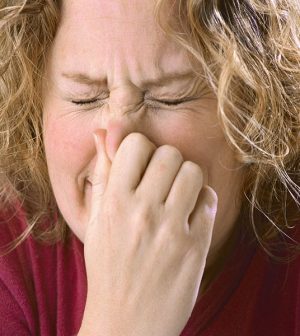- Could Your Grocery Store Meat Be Causing Recurring UTIs?
- Are You Making This Expensive Thermostat Error This Winter?
- Recognizing the Signs of Hypothyroidism
- 10 Strategies to Overcome Insomnia
- Could Artificial Sweeteners Be Aging the Brain Faster?
- Techniques for Soothing Your Nervous System
- Does the Water in Your House Smell Funny? Here’s Why
- Can a Daily Dose of Apple Cider Vinegar Actually Aid Weight Loss?
- 6 Health Beverages That Can Actually Spike Your Blood Sugar
- Treatment Options for Social Anxiety Disorder
Hold That Sneeze? Maybe Not

Holding your nose and closing your mouth when you feel a sneeze coming on just might lead to serious trouble.
The journal BMJ Case Reports includes the story of a 34-year-old man who ruptured his throat after he pinched his nose and clamped his mouth shut in order to ward off a sneeze. He suffered significant pain and was barely able to speak or swallow.
Spontaneous rupture of the back of the throat is rare and usually caused by trauma, explained the authors of the report, published Jan. 15. It can also be caused by vomiting, retching or heavy coughing.
When emergency department doctors examined the man, they heard popping and crackling sounds from his neck down to his rib cage, meaning air bubbles had entered the deep tissue and muscles of the chest, according to the report.
The man spent seven days in the hospital. He was fed by tube and given intravenous antibiotics until his swelling and pain eased.
What was the advice given when he was discharged? Let your sneezes out.
“Halting sneezing via blocking [the] nostrils and mouth is a dangerous maneuver, and should be avoided,” wrote the authors, led by Wanding Yang, from the ENT, Head and Neck Surgery department at University Hospitals of Leicester NHS Trust in England.
“It may lead to numerous complications, such as pseudomediastinum [air trapped in the chest between both lungs], perforation of the tympanic membrane [perforated eardrum], and even rupture of a cerebral aneurysm [ballooning blood vessel in the brain],” the researchers warned.
More information
The U.S. National Library of Medicine has more on sneezing.
Source: HealthDay
Copyright © 2026 HealthDay. All rights reserved.










